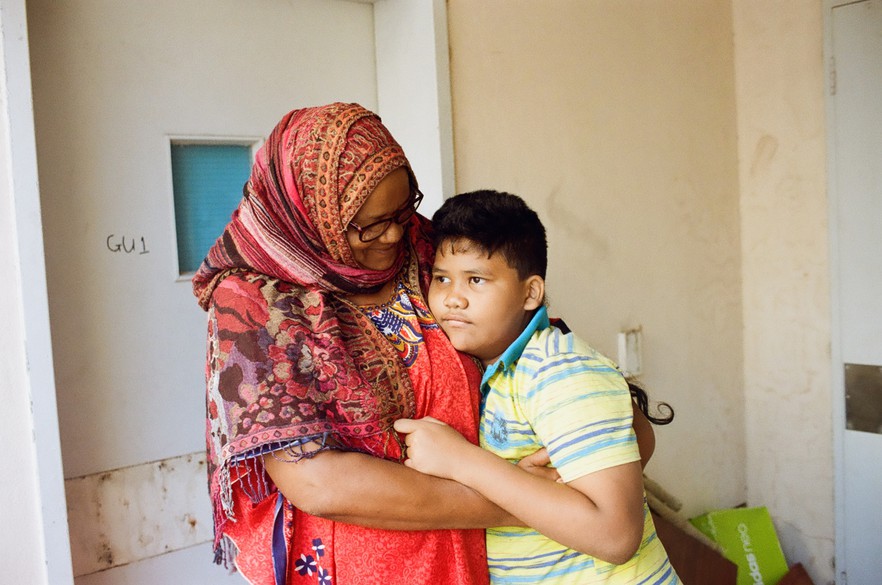
Jameelah Davids and her son Mubeen are among the 700 people who have moved into Woodstock Hospital. Photo: Sebastian Moronell
15 March 2019
Woodstock Hospital is largely unnoticeable from the bustle of Woodstock below. But a constant flow of people move in and out of its gates. Once disused and abandoned, 700 people now call this large state-owned property on Mountain Road home.
The hospital was illegally occupied in March 2017 by a handul of housing activists, campaigning for more affordable housing near the city centre (see GroundUp’s special series on the occupation). Most of the residents who occupied the hospital were facing eviction from their homes across the city. Over time, the occupation has grown, and been turned into a liveable home by its new residents. Relations between the occupiers and the City of Cape Town were adversarial to start, but recently have improved slightly.
Jameelah Davids was forced to leave her property in Chapel Street in Zonnebloem after the landlord hiked the rent from R3,600 to R9,600 per month. She and her husband took the landlord to court but lost. They found themselves on the street after three months. She took the opportunity to settle in Woodstock Hospital with her husband and two of her children, one of whom, Mubeen, is autistic. They have been staying at the hospital since the early days of the occupation.
Davids says she loves living in the hospital. “The community is close and I feel at home. There is a feeling of hope.” She’s even started a business from her new home, selling koeksisters on Sundays and catering for small events. “I just push forward … You’ve got to take every blow as it comes. That’s life man, life just goes on.”
Davids stays outside the main building in a small outhouse. Inside the main building, the hospital is divided by the occupiers into sections: Long Street, Bromwell Street, 7de Laan and Albert Road, names that any Capetonian will know. Some of the names have political connotations: the real Albert Road, a short walk from the hospital, has been a battleground over evictions. Most of the residents in Albert Road (in the hospital) used to live in Albert Road, and were evicted last year after the owner sold the buildings to a developer.
Nawhal Scheffers and her son moved into the hospital after being evicted last year. Photo: Masixole Feni
Nawhal Scheffers moved into Albert Road after her eviction from its namesake in September. Although she is struggling to make it her home, she is trying. “There is no running water … I had to bring in my uncle to connect the electricity,” she says.
The security guards are not allowing her to bring in any furniture, so instead she has to sneak it in. “The other day I had to bring in towels hidden in my shopping,” she says.
She partitioned her room, which was once an operating theatre, into a living room and a bedroom, where she stays with her daughter and grand-daughter. She also has a kitchen, from where she runs a savoury business. “I have just made a big batch of samoosas for Ramadan,” she says, “because that is when the demand will be high and I need stock.”
“I’ve seen too many photographs in my lifetime,” laughs Ghava Abdulla, who didn’t want her face to be photographed. The photos show her parents and her younger self. Photo: Sebastian Moronell
Compared to Albert Road, the Long Street section of the hospital is more established. It has a mix of shops, a crèche, and a protest banner decorating the common area. Ghava Abdulla has stayed in Long Street for over a year. She shows pictures of her parents and her younger self, which she had painstakingly hand-painted from black and white negatives. “I copied the negatives and then painted them using a chopstick … I remember exactly what colours they were wearing.”
She enjoys speaking of her youth where she worked in a photographic studio in Kimberley, the reason she does not want a photograph of her face taken. “I’ve seen too many photographs in my lifetime,” she laughs. Abdulla enjoys living in the hospital, but she does miss home. She was removed from District Six under the Group Areas Act and is still awaiting restitution as a claimant. “It is a long process … and we are still waiting. But one day I hope to go back.”
David Scholtz sits in Laeeqah Andrews’s shop that she has opened in the hospital. Photo: Masixole Feni
Shaheed Meisenheimer looks towards the camera as Deolinda Valentine prepares breakfast. Photo: Masixole Feni
Soraya Jacobs and her two children lie on the bed as the mid-morning light warms the room. Photo: Masixole Feni